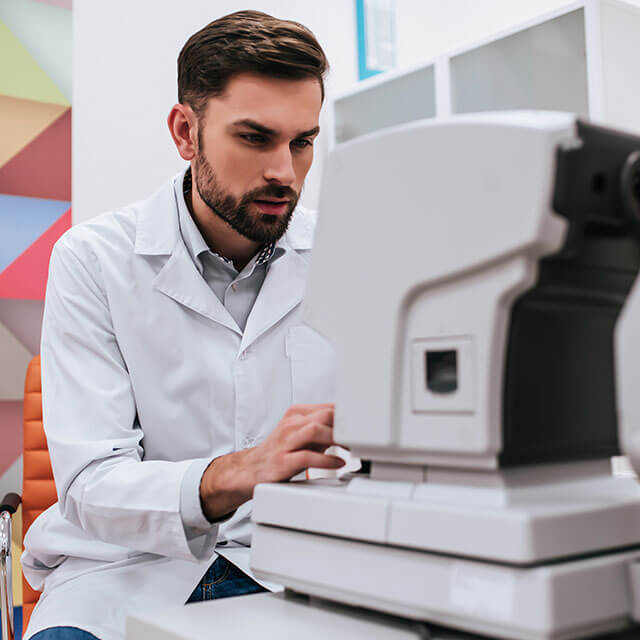Eye Exams Near You in Cockeysville, Maryland

Visiting Your Eye Care Professional
Whether you or a loved ones are having their first eye exam, a repeat eye exam, or are seeing a new eye doctor for the first time, there are a number of routine questions you can expect. But your answers to these questions during eye exams are anything but routine for your eye doctor.
That’s because there are any number of factors in your medical history that can contribute to current or potential vision problems. Understanding your lifestyle and any visual problems you’re experiencing helps point your eye exam in the right direction. There are also certain medical conditions, medications and circumstances that can put you or your family member at a higher risk for certain eye diseases.
What to Ask Your Optometrist?
We think it's essential for you to get the most out of your eye exams. That's why we've included a range of questions for you to ask prior or during your next appointment.
Questions to ask before your eye exam
- Do you accept my insurance plan’s vision coverage?
- Is payment required at the time of service?
- What will my eye exam entail?
- How long should I expect to be there?
- Will my pupils be dilated?
- What should I bring with me?
Questions to ask during your eye exam
- Given my age, eye condition and other risk factors, how often should I have my eyes examined?
- At what age should I start to schedule my children for regular eye exams?
- What lens designs and options are a good fit for me?
- Can my glasses block UV rays?
- Do all sunglasses protect my eyes from UV rays?
- What are photochromic lenses and are they a good option for me?


Things To Remember
It’s always a good idea to bring any of the following (if available) to your eye exam appointment:
- Your insurance card/insurance information
- A list of all medications, vitamins and other supplements you are taking
- Prescription glasses you currently own
- A copy of your latest eyeglass prescription
- Information on frames you like or lenses you’ve researched
Don’t forget, if participating in a flexible spending account program, you may be able to use the account to pay for portions of your eye care not covered directly by your insurance plan. Ask our receptionist for details.
Eye Emergencies in Cockeysville
Should you ever experience an eye emergency, we are here to help. Our office provides emergency services for eye infections, eye injuries and other eye emergencies. State of the art equipment allows us to examine the front surface of the eye and also digitally scan inside the eye for infection or damage. We accommodate many eye emergencies such as:
- Eye infections
- Foreign materials stuck in the eyes
- Eye trauma
- Scratched eyes
- Sudden loss of vision in one or both eyes
- Lost or broken contact lenses or eyeglasses
- Flashes of light in the vision
- “Floaters” in the vision
- Red or painful eyes
- Dislodged contact lenses
- Uncomfortable, itchy, or irritated eyes
Contact Cockeysville Opticians and Eyecare in Cockeysville for any eye emergency you or your loved one may have.


Additional Information for Eye Exams
Refraction is a critical part of an eye exam, determining your prescription for glasses or contact lenses. During this process, the optometrist will ask you to compare different lenses. They will ask, "Which is better, 1 or 2?" to refine your vision correction. It's important to note that Medicare does not cover this portion of the exam as it is a vision service rather than a medical necessity.
A contact lens exam is separate from a regular eye exam. It involves additional tests to ensure the lenses fit properly and provide optimal vision correction. This includes measuring the eye surface and evaluating the tear film, which is not part of a standard eye exam.
Understanding the difference between a medical eye exam and a routine eye exam is also essential. A medical eye exam diagnoses and treats eye health issues and diseases like glaucoma, cataracts, and macular degeneration. Medical insurance usually covers it.
In contrast, a routine eye exam primarily checks vision and updates prescriptions for glasses or contact lenses. While medical insurance may not cover it, vision insurance plans might.
Additional Frequently Asked Questions for Eye Exams
What is refraction, and why doesn't Medicare cover it?
Refraction is the part of an eye exam determining your prescription for glasses or contact lenses. It's the process where the doctor asks, "Which is better, 1 or 2?" to refine your vision correction. Medicare does not cover this portion of the exam, as it is a vision service rather than a medical necessity.
Is a contact lens exam separate from a regular eye exam?
Yes, a contact lens exam is separate from a regular eye exam. A contact lens fitting requires additional tests to ensure the lenses fit properly and provide optimal vision correction. This exam includes measurements of the eye surface and an evaluation of the tear film, which are not part of a standard eye exam.
What is the difference between a medical eye exam and a routine eye exam?
A medical eye exam focuses on diagnosing and treating eye health issues and diseases, such as glaucoma, cataracts, and macular degeneration. Medical insurance usually covers it. A routine eye exam is primarily for checking vision and updating prescriptions for glasses or contact lenses. Medical insurance may not cover it, but vision insurance plans might.

